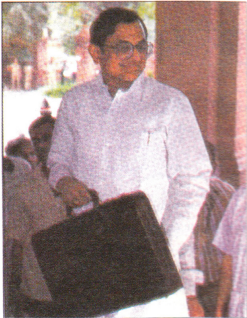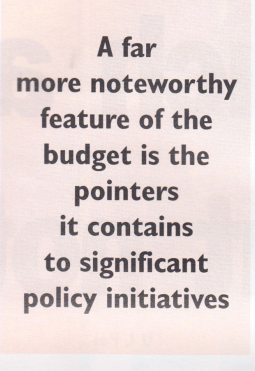The Government of India’s Union Budget for 1997-98 promises to galvanize an ailing economy. It has offered to redress many of the short comings that a lot of analysts had complained about in the past. If everything goes right, the Budget could actually turn out to be the panacea that India desperately needed. The operative word remains ‘IF’. This is because all the pious offerings of this year’s budget, that P Chidambaram, former Union finance minister, has placed before the Indian Parliament, can work only if they can generate the revenues he needs.

All the same Chidambaram has managed to give a perceptible push to the ongoing process of liberalization by providing incentives to the various economic players – the investors, both domestic and foreign, the corporate, the Non-Resident Indians (NRIs) and the tax payers to help the nation to rise to its full potential. And he has done all this without causing any slackening in the efforts to mobilize resources not only to increase the momentum of well-balanced growth in all sectors but also to contain the revenue and fiscal deficits at the acceptable levels of 2.1% and 4.5% of the GDP.
Despite sharp reductions in the tax rates, large increases in food and fertilizer subsidies and an increase of Rs 6000 (to Rs 68000) for interest payments, the gross fiscal deficit has been contained at Rs 65,454 (or 4.5% of GDP). This is unlikely to be sustained. Besides, the whopping oil pool account deficit of Rs 18,500 has remained untouched.
The strong positive signals unleashed by the reduction in corporate taxes, the removal of surcharge on corporate tax and the removal of double taxation on dividends earned from shares are sure to boost investments and arrest the deceleration in industrial growth. The overall impact of reduction in taxes can be obtained only through promoting domestic investments which in turn is possibly only when savings increase. This budget satisfies that requirement. The budget has already kick-started the stock markets in the country which was lying low for quite sometime now.
The former finance minister has also asked for the road map to capital account convertibility to be drawn up. Capital account convertibility could only be done in a phased manner. The step that has now been taken is a positive signal to foreign investors and it will take India to face a market-oriented economy. But the disappointing factor is that FM has set no time- frame for capital account convertibility. The further relaxation on cross-border movement of capital is another feature. Globalization means Indian firms venturing out into the world and they need greater freedom to take funds out. Chidambaram has conceded this, to his credit. There is little that is new, however, in the rest of the offer of a calibrated move to full convertibility. Whether FERA (foreign exchange regulation act) would shed its venomous fangs when Regulation becomes Management in the Act’s name remains to be seen. The move to raise the ceiling on cumulative investment in a company’s equity by Foreign Institutional Investors, NRIs and overseas corporate bodies from the present 24% to 30%, should the company so choose, is a welcome indicator. This by itself is far less significant for boosting foreign investment than the overall improvement in macroeconomic management, procedural simplicity and availability of social and physical infrastructure.

A far more noteworthy feature of the budget is the pointers it contains to significant policy initiatives. The first is the opening of the insurance sector. This has been done in a guarded manner, but this is understandable considering the susceptibilities of the Communist-Marxist led Left Parties.
There are other key measures: restructuring Center/State financial relations through acceptance of the tenth Finance Commission’s recommendations; allowing companies to buy back shares, which will calm some of their worries about the takeover code; and the foreign exchange control relaxation’s are on the way. But it is in setting overall direction that Chidambaram’s budget has its greatest significance. The mood of the country could be changed by it, from one of glum resignation about the prospects to one of reasonably buoyant hope-provided that there are not too many constraints to economic growth and inflation does not take off. Instead of being hemmed in by the constraints of a 13-party coalition, he has gone out to meet its constituents positively and not defensively. Almost everybody whose pockets are actually affected by the Budget measures will be happy today. The Communists may object to the small liberalization of insurance, but they can hardly complain about the increase in social sectors spending and subsidies.


